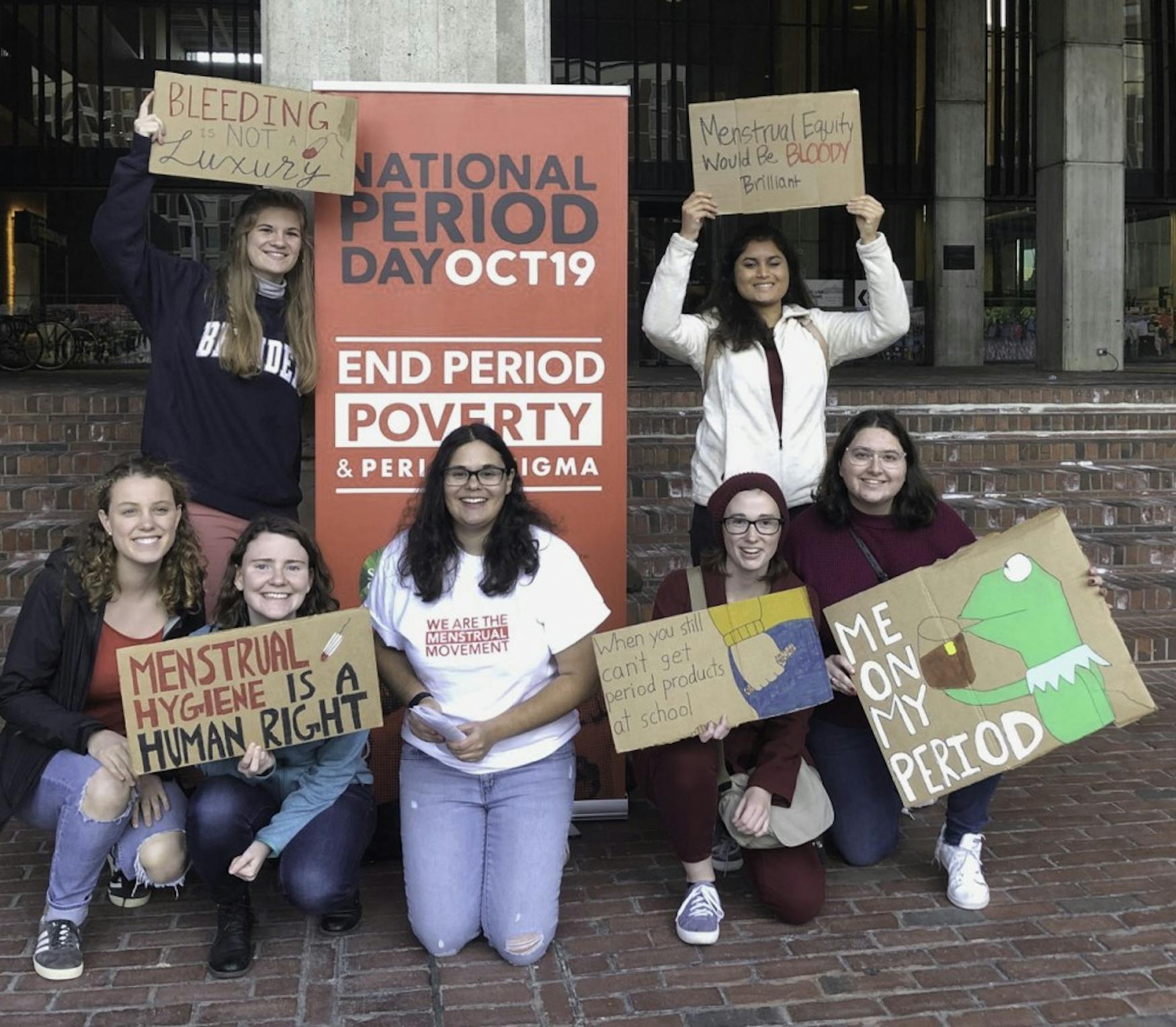That's it! Period!
Brandeis students attended a rally in protest of menstrual costs and stigma.
Members of the Brandeis PERIOD club traveled to Boston City Hall Plaza to join other PERIOD chapters in celebrating National Period Day on Oct. 19. In an interview with the Justice, Linzy Rosen ’22, founder and current president of the Brandeis PERIOD chapter, stated that the group wanted to achieve two goals at the downtown Boston celebration: to “bring attention to a highly stigmatized issue” — menstruation and associated struggles — and to rally in support of the ‘I AM’ bill, which Rosen said “would provide funding, if passed, for period products to be available in public schools, prisons and homeless shelters.”
According to a Mass Now survey, 56% of school nurses “reported observing students missing class to obtain period products” and 25% of all shelters revealed that they do not provide menstrual products. Even those shelters and schools that are able to provide such products, the study concluded, do not have enough resources to “meet the needs of menstruators they serve” — menstruators being men, women and non-binary people who menstruate. Rosen said that bringing “menstrual equity to the conversation about social justice” and addressing the problem of period poverty in Massachusetts were some of the reasons why she founded the club last year. Upon Rosen’s arrival to Brandeis, she realized that menstruation was a “big missing portion of the conversation and activism” on campus, and she became determined to “engage students in an issue … that is really taboo in society,” with the hopes of empowering both menstruators and non-menstruators to openly discuss periods.
Another club member, Sydney Carim ’23, mentioned that she “joined the club because it intrigued [her] that people were talking about periods and being so open about it,” which she said she had not been used to before starting Brandeis. She added that, so far, being a part of the club has been incredibly empowering and that she’s been able to change her mindset about menstruation, coming to “see it as something that more than half of the population goes through,” and thus shouldn’t be treated as a taboo.
The club members who attended the rally regarded it as a success. Pallavi Goel ’21 said that the presence of several Massachusetts legislators was “surprising” and felt “really powerful” because it conveyed an overarching support for the cause. The speeches, she said, made her feel like “people actually cared about this issue” and inspired her to “want to get more involved and dedicated to this cause.” Rosen found the age diversity at the rally incredibly significant, recounting that in the midst of the rally, she saw a six year old child wearing a PERIOD t-shirt. To her, this proved that the impacts of menstruation are distributed among a large range of people, and showed her that many people “care about this issue.”
And they do care about this issue — greatly. Brandeis students who attended the rally told the Justice they were angry at the lack of discussion surrounding the struggles that both menstruators and non-menstruators go through; struggles that are often not discussed because of the stigma surrounding periods. Carim added that she really enjoyed the presence of non-menstruators. She discussed the common tendency to “look at [menstruation] as an issue that only menstruators have to deal with,” and argued that “in the end, if we are going to make any difference, we need everyone to ally together and work toward a solution.”
The rally was one of the largest in the country, and the group told the Justice they felt its gravity. Cassidy Addams ’22 said she hadn’t “seen activism on this scale before,” adding that the rally was “very impressive.” Her fellow PERIOD member Savannah Jackson ’22 agreed: “To be in downtown Boston with a microphone shouting about what’s going on and talking about people’s bodies means a lot. To have Linzy so involved and having such an emotional part in this.” Both are excited about the potential for PERIOD@Brandeis going forward, looking fondly on their successes like their recent menstrual product drive, but with determination to battle the stigma they feel has hurt them previously. In Jackson’s words, “Everyone here is angry, everyone is tired of being pushed aside.”
“It’s really important as a menstruator to fight for my right to products and to battle against the stigma. It needs to be eradicated,” Carim said. Her main desire from this movement was understanding. She said, “The thing that makes me [angriest] is that the blood from a period is essentially the blood of life, but that is seen to be dirtier than the blood of violence and of death. That bothers me, and I don’t think I understand how others don’t get that.”
Now that this year’s National Period Day has ended, the members of the PERIOD club are working on developing new activities and events to promote discussion about menstruation for the rest of the academic year. Rosen encourages everyone — she stipulated that this extends to those who identify as a menstruator and those who don’t — to attend the club meetings and become involved in supporting and discussing an issue that “affects the entire community.” Carim quickly added that PERIOD is one of the most “enthusiastic clubs” that she’s ever been a part of, and that there’s an unmatchable energy among the club members that makes discussing a “heavy issue” a more empowering and “fun” experience. PERIOD@Brandeis member Madison Leifer ’22 reiterated that “the best way to break a stigma is to talk about it, and that is exactly what PERIOD enables.”



Please note All comments are eligible for publication in The Justice.